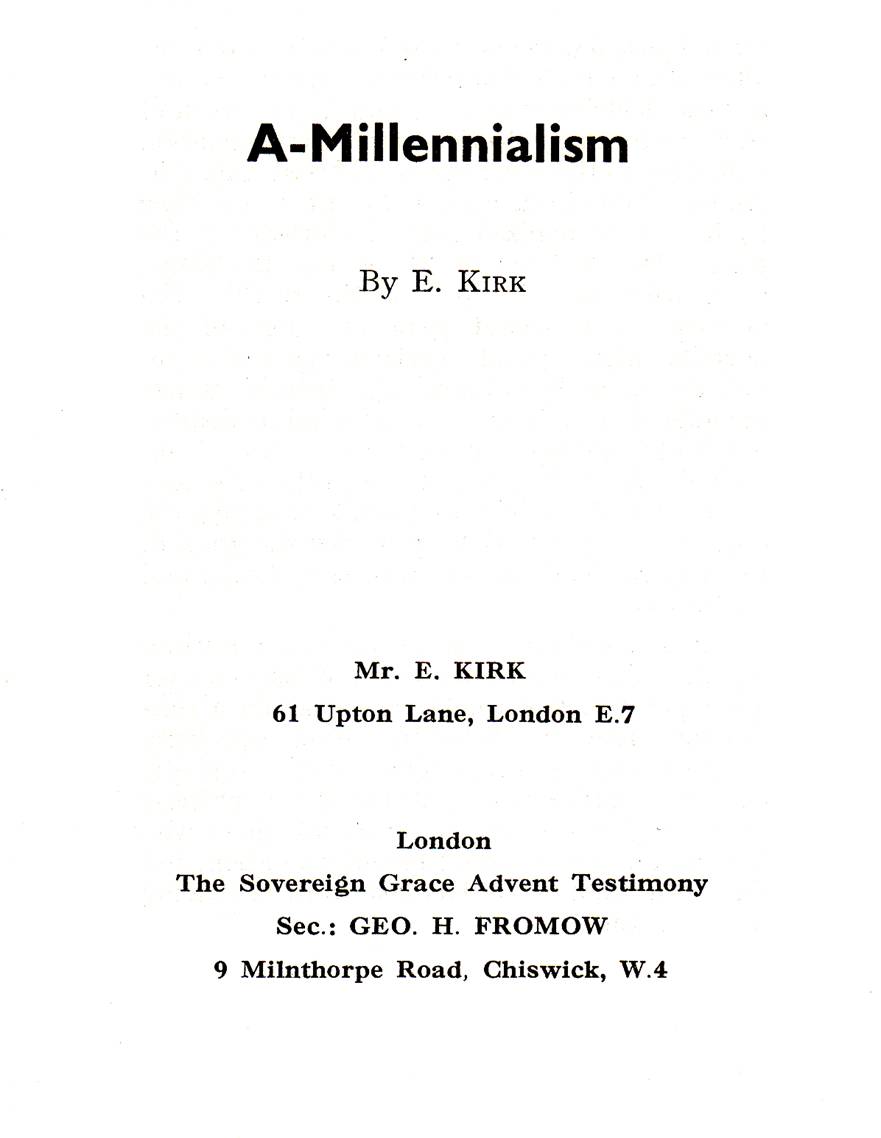
IN the past few years, there has been a notable and welcome
revival of interest in what is known as the doctrine
of grace, that is, the truth of God respecting election and
predestination according to the sovereign will of God. One cannot but rejoice in such a revival; at
the same time let it ever be realized that Knowledge of the truth (see 2 Peter 2 : 21) is not the same, necessarily, as the love of the truth. The novelty - as it would seem to
some - of the doctrine might appeal to certain types of mind, but the mere
head-knowledge thereof, unless accompanied by humbleness of mind, is dangerous,
and if not the fruit of the Holy Spirits in-working, it will but add to the
professors condemnation. It has been well
said that to hold the doctrine of grace is good, provided the grace of the doctrine holds the one professing Christ and
His words.
But, alongside this renewed interest in Puritan doctrine,
there has been a trend of disregard for other parts of truth held very dear by
a considerable number of believers during, especially, the past hundred years. This is that prophetic part of Scripture
relating to the Divine purpose concerning earthly Israel. There are those who hold that GOD has cast off
Let some of the views held by these sincere believers he examined
in the light of Scripture. They are
described as a-millennialist. A is deprivative
(equal to a in atheist, that is no god). Hence their views are summed up in the phrase,
no millennium. Now this word millennium
is not in the Bible, but it means, one thousand years, which expression is found in Revelation 20: 2, 3, 4, 5, 6, 7.
The opinion is formed and freely expressed [by the a-millennialists] that this phrase is not to be taken literally, but symbolically. Indeed, the writer has heard it said that we are in the millennium now. !!
But are not periods of time elsewhere in Scripture to be taken
literally? Examples of such are the four hundred years (Gen 15:
13, Exod. 12: 40, Acts 7: 6), the seventy years captivity (Dan.
9: 2), the seventy weeks (Daniel 9: 24). Further, as if to emphasize the exactness of
the time, the three and a half years of Rev. 12: 14 is equated with the forty and two months and the thousand two hundred and
three score days of Revelation 11: 2, 3.
It is not without significance that nigh six thousand years
have elapsed since the creation; and seeing that one day is with the LORD as a thousand years, and a thousand
years as one day (2 Pet.
3: 8), may it not be agreeable to Scripture to say that six days have nearly been completed? According to Divine commandment, every seventh
day was a day of rest, and so was every seventh year (Exod. 20: 10,
11; Lev.25: 4). By analogy, it may be affirmed
that the thousand
years of Revelation 20 will also be a sabbath day.
That there is to be this long period of rest is borne out by many Scriptures, for
example, Psalm 72 and Romans 8: 19-23. In that passage, we are to read creation rather than creature. There is a time coming when the earth shall be full of the Knowledge of the LORD, as the waters cover the sea (Isa. 11: 9). Remembering
the words of the Lord Jesus, When the Son of man cometh, shall He find faith on the earth?
(Luke 18: 8), it cannot be that the
fulfilment of Isaiahs prophecy will take place before the coming of the Lord. It is not according to Scripture to expect a
world-wide acceptance of the Gospel through intensive evangelism. The Lords words are, And this Gospel of the kingdom shall be preached in all the world for a witness unto all nations, and THEN
shall the end come (Matt. 24: 14). Not the end of all things, but the end of the
age (verse 3 and see ch. 28: 20).
Since, therefore, Isaiahs prophecy, as quoted above, must yet
be fulfilled, such a period of a thousand years is plainly necessary. That prophecy includes a description of the
cessation of the groaning of creation
(Isa. 11: 6-9). Why the literality of these words should be
doubted is not easy for a simple reader of the Bible, comparing Scripture with
Scripture, to understand. The writer feels that the a-millennial
position presents to the mind more problems than it is able to solve.
The
Future of
It has been stated, somewhat recently, that,
It is not easy to follow the reasoning of such as consider
there is no future for the nation of Israel, particularly in view of the Holy
Spirits use of the name Jacob (Rom. 11: 26). Have not they pondered the solemn words, Be not high-minded, but fear: for if God spared not the natural branches, take heed lest He also
spare not thee (Rom. 11: 20, 21, and context)?
The writer is of opinion that covenant-truth
is not fully understood if Gods
promises concerning
In conclusion, the writer would appeal to those who differ
from the views expressed in the foregoing to re-examine their standpoint, by
studying the Scriptures quoted, and particularly in their contexts.
May God, by His Holy Spirit, lead both writer and readers into
all His Truth.
(From The
Student of Scripture).*
* Reprinted from Watching
and Waiting, Jan.- Feb., - Mar., 1948.